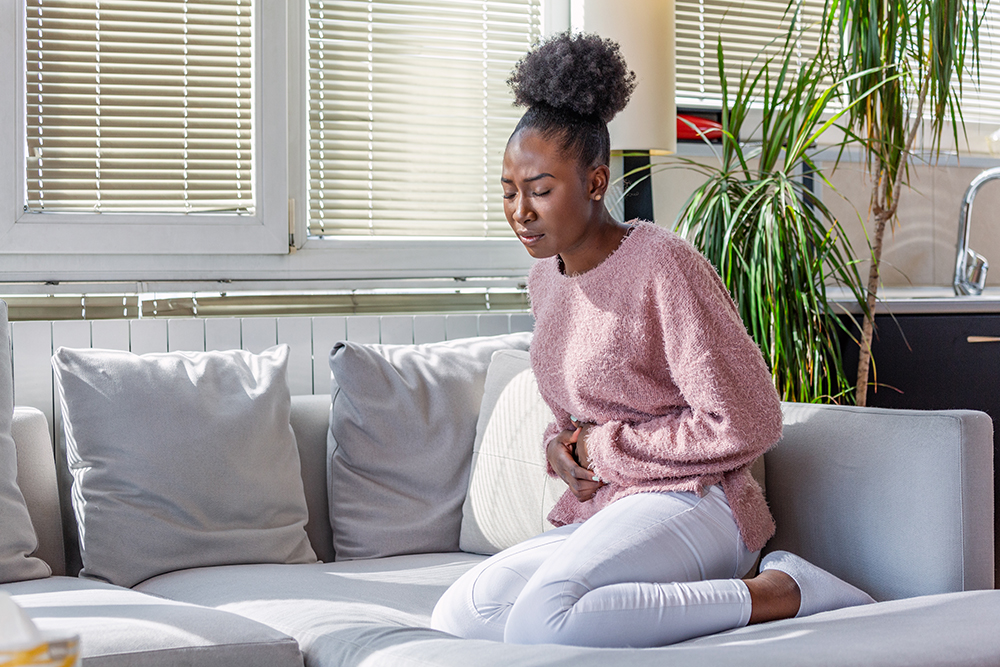Everyone knows menstrual cramps are common during that time of the month. But is it normal to experience cramps a week before your period?
In this article we will discuss cramps, if feeling them a week before a period is normal, how to make that monthly cycle less painful, and when to seek assistance.
What are Cramps?
Menstrual cycles, AKA periods, are different for every woman. And the intensity of a period can range from mild symptoms to pain that makes daily life a challenge. One common symptom present in either mild or severe periods is cramps.
According to The Mayo Clinic, as a woman’s body discards her monthly buildup of the uterine lining, this causes mild to severe cramps.
The presence of cramps, therefore, indicates that the body is flushing out what it had prepared in the event of conception. Cramps are a common symptom to indicate the start of the different stages the female body goes through with fertility. The menstrual cycle is one of the phases that the female goes through.
Healthline explains the menstrual cycle can be divided into four phases. The cycle starts when the egg develops and is released from the ovaries while the lining of the uterus builds up. If a pregnancy doesn’t happen, the uterine lining sheds. Once that is complete the cycle starts over.
- First Stage: Menstrual phase
- Second Stage: Follicular phase
- Third Stage: Ovulation phase
- Fourth Stage: Luteal phase
The length of the phases can differ from woman to woman, and the duration can change. This is why many OB/GYN physicians will recommend that their patients track their cycles. This way patients can help determine what is typical of their body and to know when to seek medical attention for any new changes.
Cramps A Week Early?
Although most women experience cramps as a result of their period, some women experience cramps before their period begins, during the premenstrual syndrome stage (PMS).
Healthline explains that PMS occurs when there is a change in estrogen and progesterone levels. PMS itself is a point in a woman’s cycle signaling to the body that there was no conception and that it is now time to shed the uterine lining, which will pass through the vagina.
The Mayo Clinic asserts that early menstrual cramps typically start 1 to 3 days before the first day of the cycle. Most patients find relief once the pain subsides after a few days, so cramping before a period is perfectly normal.
Therefore, while some women do experience cramping a few days before their period starts, it’s rare for cramping to begin a week or more in advance. The discomfort that could be mistaken for cramps may be an indicator of another health problem that needs to be evaluated.
This doesn’t mean that cramping should just be ignored though.
Home Remedies
Thankfully, there are many ways to help relieve patients of the discomfort of cramps.
EverydayHealth offers a list of different home remedies that can help make those days less painful. Most of the symptoms of a menstrual cycle can be treated at home, and these home remedies offer most women relief from the pain.
- Performing yoga
- Curling up with a heating pad:
- Taking a safe painkiller
- Drinking herbal tea
- Monitoring Magnesium in Diet
These home remedies are beneficial for relieving some of the discomforts caused by a woman’s monthly cycle. Nonetheless, if you experience cramps that impact your daily life, then see an OBGYN to determine the cause. As sometimes cramps can be a sign of another health condition that is not the menstrual cycle.
Whether it is connected to the menstrual cycle or not, if the cramps are debilitating and interfering with daily life, then speaking with a medical professional is the next step.
How We Can Help You
Menstrual cycles are a normal part of life for women, but discomfort from the cycle shouldn’t be debilitating! Cycles can vary from month to month, so remember if one month you experience heavy bleeding or the days of bleeding are different, this isn’t a cause for alarm.
At MCR Health, our gynecologists provide comprehensive care for the body of every woman. By helping make that time of the month more bearable to continuous care they can count on.
If you have any questions, our team is happy to help you better understand your body when you schedule an appointment!

